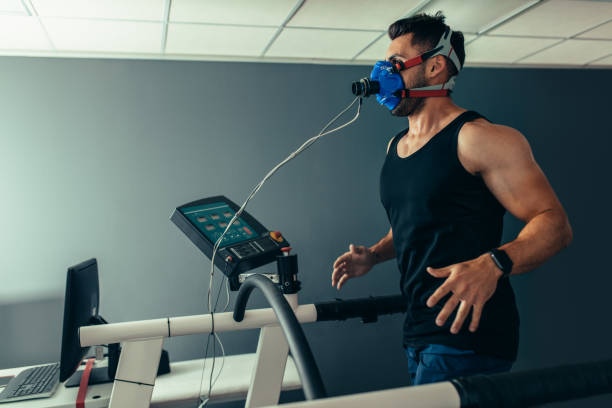Occupation Description Exercise Physiology is a discipline that includes clinical Exercise physiology and applied exercise physiology. Applied Exercise Physiologists manage programs to assess, design, and implement individual and group exercise and fitness programs for apparently healthy individuals and individuals with controlled disease. Clinical Exercise Physiologists work under the direction of a physician in the application of physical activity and behavioral interventions in clinical situations where they have been scientifically proven to provide therapeutic or functional benefits.
Job Description Exercise physiologists develop physical activity programs to help people improve components of their fitness, such as cardiovascular function, muscular strength, or flexibility.
Exercise physiologists typically do the following: Analyze a client’s medical history to assess their risk during exercise and to determine the best exercise and fitness regimen for the client
Perform endurance, stress, and other tests with medical equipment and analyze the resulting data
Measure clients’ blood pressure, oxygen usage, heart rhythm, and other key health indicators
Develop exercise programs that address clients’ fitness needs
Implement programs to improve clients’ health
Exercise physiologists work to improve people’s overall health. Many of their clients have chronic medical conditions, such as pulmonary (lung) disease. Exercise physiologists provide health education and exercise plans to help clients improve their respiratory, circulatory, and other systems. Some physiologists work closely with primary care physicians, who may prescribe exercise regimens for their patients and refer them to exercise physiologists. The physiologists then work with these patients to develop individualized treatment plans that will help the patients meet their health and fitness goals. The following are examples of types of exercise physiologists: Applied exercise physiologists study the physiological effects of exercise. They may research topics that explore the link between exercise and illness, such as whether increasing physical activity slows the progression of disease. Clinical exercise physiologists work with a range of client populations in a variety of settings. For example, they may design exercise programs or promote wellness strategies in schools, taking into account the students’ ages, development, and other factors.
As a clinical part of the health and wellness team, Exercise Physiologists can work with Personal Fitness Trainers, Exercise Science Professionals, and physicians in cardiac rehabilitation, typically in a hospital or clinical setting. Exercise Physiologists work with clients who have been diagnosed with a chronic metabolic, pulmonary, or cardiac disease.
Education Programs Length: Exercise Physiologist programs can be completed in a two year Master’s degree level program. Prerequisites: Applicants should have a high school diploma or equivalent, meet the specific institutional entrance requirements, and have a Bachelor’s degree in Exercise Science. Curriculum: Exercise Physiologist programs will include a comprehensive academic curriculum and at least one culminating internship experience.
Certification/Registration Organization(s) ACSM - American College of Sports Medicine
401 W. Michigan St. Indianapolis, IN 46202
Phone: 317-637-9200
Website: www.acsm.org ACE - American Council on Exercise
4851 Paramount Drive
San Diego, CA 92123
Phone: 858-576-655
Website: www.ACEfitness.org NASM - National Academy of Sports Medicine
26632 Agoura Road Calabasas, CA 91302
Phone: 800-460-6276
Website: www.nasm.org NCSF - National Council on Strength and Fitness
5915 Ponce de Leon Blvd., Suite 60
Coral Gables, FL 33146
Phone: 800-772-6273
Website: www.ncsf.org
Careers/Curriculum Before embarking on your allied health journey, delve into the essential requirements of your desired profession. Understanding the certification, registration, or licensure process will help you select the right education program and confidently pursue your career goals. The following organization(s) can assist you in becoming an allied health professional: AAHPERD - American Alliance for Health, Physical Education, Recreation, and Dance
1900 Association Dr
Reston, VA 20191-1598
Phone: 800-213-7193
Website: www.aahperd.org AACVPR - American Association of Cardiovascular and Pulmonary Rehabilitation
401 North Michigan Ave. Suite 2200
Chicago, IL 60611
Phone: 312-321-5146
Website: www.aacvpr.org MFA – Medical Fitness Association
P.O. Box 73103 Richmond, VA 23235-8026
Phone: 804-327-0330
Website: www.medicalfitness.org AKTA – American Kinesiotherapy Association
CCB-KT
P.O.Box 1390
Hines, IL 60141-1390 Phone: 800-296-2582
Website: www.akta.org
ACSM - American College of Sports Medicine
401 W. Michigan St. Indianapolis, IN 46202
Phone: 317-637-9200
Website: www.acsm.org ACE - American Council on Exercise
4851 Paramount Drive
San Diego, CA 92123
Phone: 858-576-655
Website: www.ACEfitness.org NASM - National Academy of Sports Medicine
26632 Agoura Road Calabasas, CA 91302
Phone: 800-460-6276
Website: www.nasm.org NCSF - National Council on Strength and Fitness
5915 Ponce de Leon Blvd., Suite 60
Coral Gables, FL 33146
Phone: 800-772-6273
Website: www.ncsf.org
